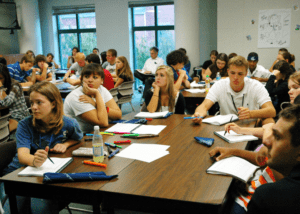Opinion
The Road Less Taken: When ‘hygge’ isn’t working, try the Danish word ‘pyt’
Jessica Alexander
This article is more than 6 years old.

“You’d better push the button and let it go” – that was a Sugarbabes song, right? (photo: Lead Beyond)
As an author and cultural researcher, I have spent a lot of time in Danish schools studying parenting and education for my books. I’ve especially focused on the ‘Class’s Hour’ (klassenstime), which is a core part of the Danish curriculum that essentially teaches empathy to children aged 6-16 and is generally set for a special time once a week.
Time to be heard
The purpose of the klassenstime is for all the students to come together in a comfortable setting to talk about any problems they may be having. Together, the class tries to find a solution. This could be an issue between two students or a group, or even something unrelated to school.
“The important thing is that everyone feels heard,” explains Jesper Vang, a middle school teacher at Tingkærskolen in Odense.
“Our job as the teacher is to make sure the children understand how and why other people feel the way they do. This way, we come up with a solution together based on real listening and real understanding.”
If there are no problems to be discussed, then they simply come together to relax and hygge – the now famous Danish word for cosying around together.
Buckets and buttons
But what if putting yourself in other people’s shoes isn’t the solution, and you really just need to put something behind you? Some classes are encouraged to write down any problems that are bothering them, fold them or crumple them up, and throw them in a ‘pyt spand’ – a never mind bucket.
It was only after I learned about the word ‘pyt’ and the never mind bucket that I started noticing small wooden squares on the walls of many classrooms with blue metal buttons and the word ‘pyt’ written above them.
“What is that?” I asked a teacher inquisitively one day. “That’s a pyt button,” came the reply.
“Is that like the never mind bucket?” I asked. She laughed. “Yes, it’s a similar concept. When kids are annoyed about something, we encourage them to hit the pyt button and let it go.”
Trash bin for troubles
I even saw it in the playgrounds. Kids would get upset at a perceived injustice, but as voices were rising and rules hotly debated, a teacher would magically materialise a blue or red button and, like contestants on a game show, the kids would run up and smack the pyt button, before continuing the game seemingly scuffle-free.
As I was leaving a class one day with a small grievance of my own, I decided to hit the pyt button myself, and I really did feel a little better. We don’t have a word for ‘pyt’ in English, but I think there is something comforting about physically pushing away our troubles or, literally, throwing them away.
This doesn’t work for everything of course. It isn’t for life-altering traumas or serious issues. But when you can’t seem to put a small unchangeable problem behind you, try putting it in a ‘pyt’ bucket. You might just find it helps.

About
Jessica Alexander
Jessica is a bestselling US author, Danish parenting expert, columnist, speaker, and cultural researcher. Her work has been featured in TIME, Huffington Post, The Atlantic and The NY Times, among others. She graduated with a BS in psychology and speaks four languages. She currently lives in Italy with her Danish husband and two children. Follow her on Instagram










































